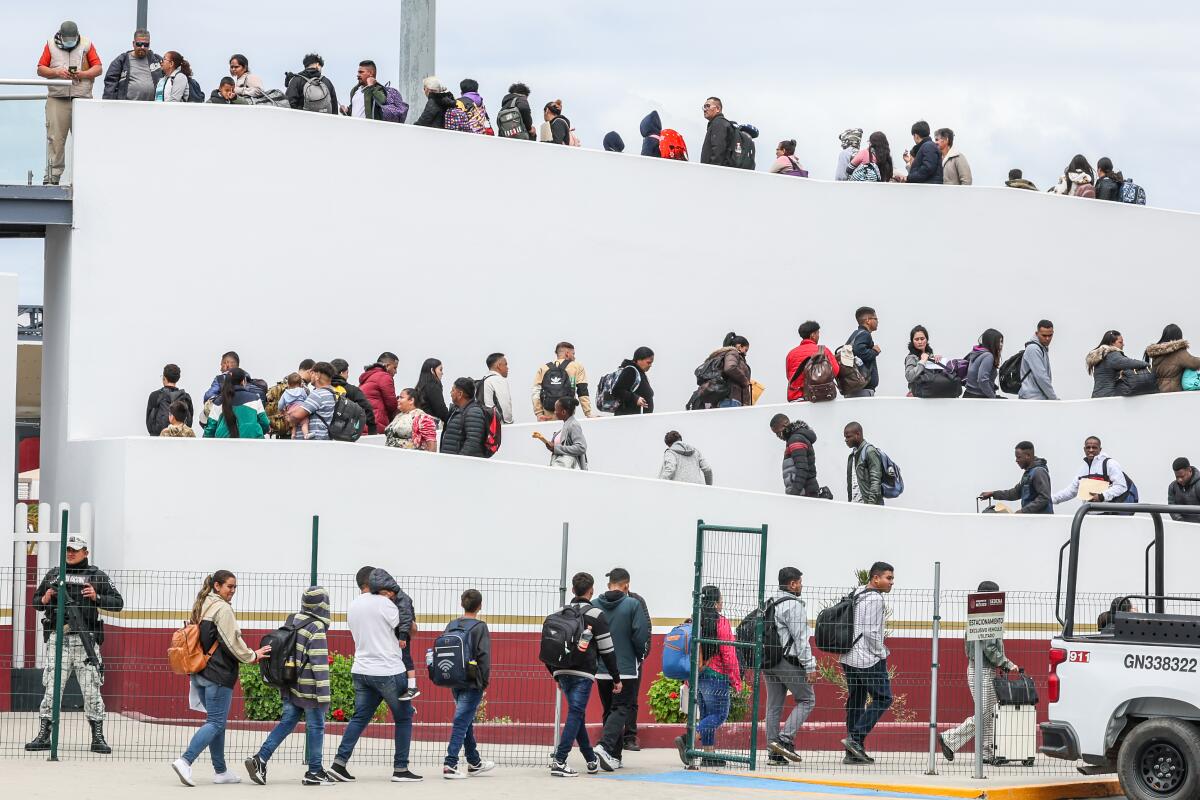Disappointment at border as Trump cancels immigration program

- Share via
- “We don’t know what we are going to do,” said an asylum seeker from Cuba.
- Cancellation of the program was one of several tough measures announced by the Trump administration to curb immigration.
MEXICO CITY — Among the first on-the-ground effects of President Trump’s sweeping immigration revisions was visible Monday on the Mexican side of U.S. ports of entry, where hundreds of disconsolate asylum applicants were stunned to learn of the cancellation of a program aimed at easing the process of applying for asylum.
Many lined up early Monday, the day of Trump’s inauguration, at the ports of entry for scheduled interviews with U.S. inspectors — only to hear that their interviews had been canceled and that the cellphone application program, known as CPB One, had ended.
The demise of CBP One leaves tens of thousands of migrants stranded in Mexico without potential legal pathways to enter the United States. Some have waited six months or more for their CBP One interviews. Many others were in the queue awaiting appointments.
“We don’t know what we are going to do,” said a distraught Aliana Armenta, 22, from Cuba, speaking from the Mexican side of the border bridge that spans the Rio Grande between Ciudad Juárez and El Paso.
She, her husband, Fidel Jiménez, 23, and the couple’s 1-month-old daughter, Karla, had a CBP One interview scheduled for Monday in El Paso. The family arrived at 5 a.m. on the Mexican side of the bridge to learn, along with other prospective asylum-seekers, that the app had been canceled, their hopes dashed.
“Maybe we will go back to Mexico City,” mused Jiménez, noting that they had waited in the Mexican capital for months for confirmation of their CBP One interview. “We really don’t know.”
Hundreds of others bared their disappointments at crossing points along the border. Some cried and hugged upon learning of CBP One’s cancellation.
CPB One was originally developed to help prevent backups of travelers entering the country legally. After downloading it to their phones and entering their passport information, foreign nationals could use the application to smooth their way through border crossings and airports.
President Donald Trump was sworn in Monday morning among a group of dignitaries and guests inside the Capitol.
In 2023, the Biden administration expanded use of the app in a bid to help bring order to a crush of asylum-seekers arriving at the Southwest border. CBP One has since facilitated the entry of almost 1 million people, mostly prospective asylum-seekers, into the United States via ports of entry along the U.S.-Mexico border. The vast majority were given notices to appear in U.S. immigration courts for adjudication of their cases.
The Biden administration lauded the app as part of the solution to the border crisis. Immigrant advocates complained that CBP One was glitch-prone and reduced the right of asylum to a lottery.
Trump and Republican leaders denounced the app, saying it amounted to an “open borders” policy that encouraged more migrants to head for the United States without proper vetting for criminal histories.
The cancellation of the program was one of several immigration-related measures announced Monday. At his swearing-in ceremony in Washington, Trump said he would declare a national emergency at the southern border and sign executive orders to combat illegal immigration.
In addition, Trump said he planned to reinstate Remain in Mexico, a controversial program launched in his first administration — and ended by Biden — that forced asylum-seekers arriving at the Southwest border to await U.S. immigration court dates in Mexico. Critics called Remain in Mexico inhumane and a boon for drug cartels preying on stranded migrants, but supporters said it was an effective deterrent to bogus asylum claims.
Special correspondents Cecilia Sánchez Vidal in Mexico City, Gabriela Minjares in Ciudad Juárez and Gabriela M. Cordova in Tijuana contributed to this report.
More to Read
Sign up for Essential California
The most important California stories and recommendations in your inbox every morning.
You may occasionally receive promotional content from the Los Angeles Times.











